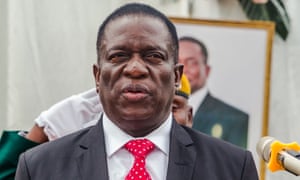
President Emmerson Mnangagwa was Mugabe’s right-hand man and has been personally implicated in the violence of the 1980s. Photograph: Jekesai Njikizana/AFP/Getty Images
A film about the massacre of tens of thousands of civilians in Zimbabwemore than 30 years ago was screened on Saturday in Bulawayo, despite a campaign of pressure and intimidation aimed at its director by police and intelligence agents.
Observers have described the release of the documentary as a litmus test for President Emmerson Mnangagwa, who took power in the former British colony when Robert Mugabe was ousted after 37 years in power in a military takeover last year.
Made by local the Zimbabwean activist and journalist Zenzele Ndebele, the film investigates the killings of as many as 20,000 civilians in the south of Zimbabwe by the army in the early 1980s. It was shown for the first time at an arts festival in Bulawayo, the southern city close to where some of the worst atrocities took place.
“Zenzele’s film has come at right time. It will be the best work to test how sincere the new dispensation is about artistic freedoms and freedoms of expression as contained in the constitution,” the festival director, Raisdon Baya, said.
Mnangagwa, 75, has struggled to convince international powers and many within Zimbabwe that he is genuinely committed to reforming a corrupt and repressive state. He was Mugabe’s right-hand man and has been personally implicated in the violence of the 1980s. The campaign was known as the Gukurahundi, a local word meaning early rain that cleans away dust and chaff, and aimed to end opposition to the ruling Zanu-PF party in the south and west of the newly independent country. The vice-president, Constantino Chiwenga, and Perence Shiri, a minister, have also been accused of involvement. All deny any wrongdoing.
The Observer’s pioneering coverage of what were then called the Matabeleland massacres led to a bitter clash between its editor, Donald Trelford, and the tycoon Tiny Rowland, who had extensive business interests in Zimbabwe. Trelford’s own reporting from described “tribal slaughter” perpetrated by Mugabe’s forces.
During Mugabe’s rule, few families and victims spoke openly about the Gukurahundi offensive, and experts say the episode was written out of the official history of Zimbabwe.
“If you are portraying your administration as a new dispensation, there has to be a clear redress and a moving on from the past …. There has to be truth telling, compensation and apologies,” said Miles Tendi, a specialist in Zimbabwean politics at Oxford University.
The fall of Mugabe has led to some easing of restrictions on artistic expression. Thomas Mapfumo, a hugely popular singer returned from self-imposed exile in the US to give a concert in Harare, the capital, while a play about the massacres of the 1980s, banned under Mugabe, drew large audiences this past summer.
However, the screening of Ndbele’s film could only go ahead because Selo Masole, chairperson of the National Peace and Reconciliation Commission (NPRC), travelled to Bulawayo to be present. Masole, a retired judge, has described the Gurukahundi massacres as a top priority for the NPRC, an independent constitutional body that started work in January.
Ndebele, 40, who funded the documentary himself, was called to a police station in Bulawayo last week, where he refused to hand over a copy of the film, which officials said incited violence and hatred. After being harassed on social media, threatened and followed by intelligence agents, he travelled abroad.
“We heard all the stories about Gukurahundi when we were young. When Mugabe went, I said to myself that this was a good opportunity. There was a need to tell the story … Zimbabwe is a divided nation and this issue is a scar that won’t heal. People are still very angry,” Ndebele said.
The film is based on dozens of interviews with witnesses of the massacres, relatives of victims and dissident soldiers.
Mnangagwa, who has backed the work of the NPRC, has pledged apologies and reparations.
“Wherever any community has suffered any injury, if it is that injury that has to be repaired, we do it,” he said at Davos earlier this year.
Although the elections in July did not see the systematic violence of those under Mugabe, alleged irregularities during the count and violent repression afterwards have resulted in only lukewarm support for Mnangagwa and the ruling Zanu-PF party from major international powers.
This has made the prospects of the multibillion-dollar financial packageneeded to stave off economic collapse unlikely, which has in turn discouraged private investors.
Tendi said the focus on Gukurahundi risked obscuring the many other human rights abuses committed by the Mugabe regime over the decades. “There is so much more and I’m not seeing any appetite for addressing that,” he said.


